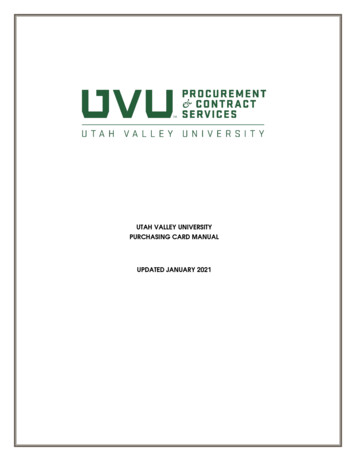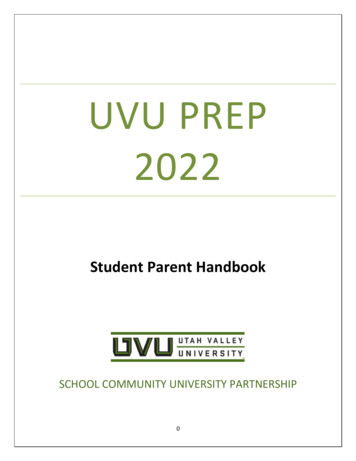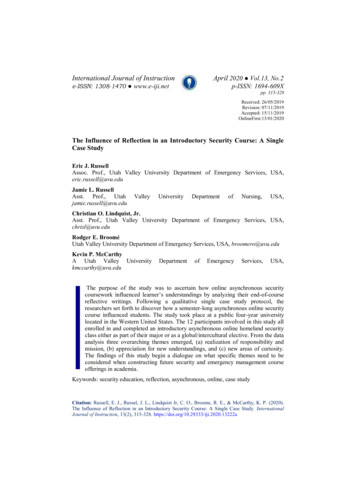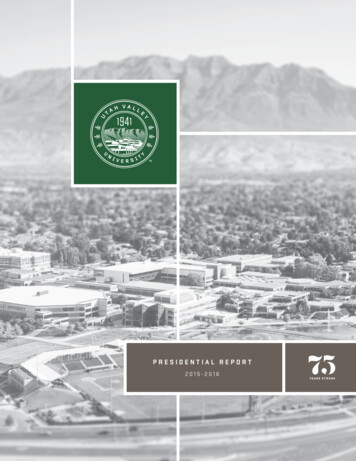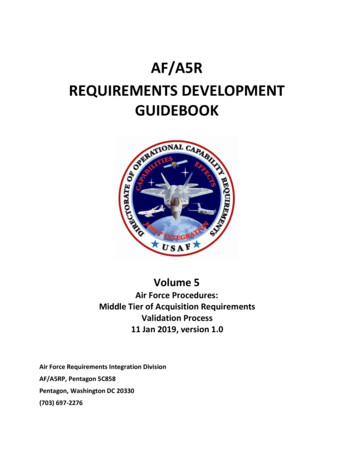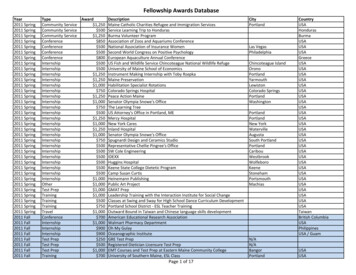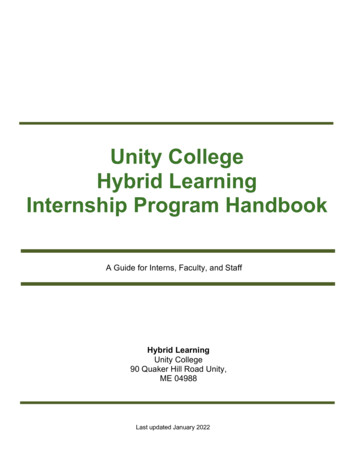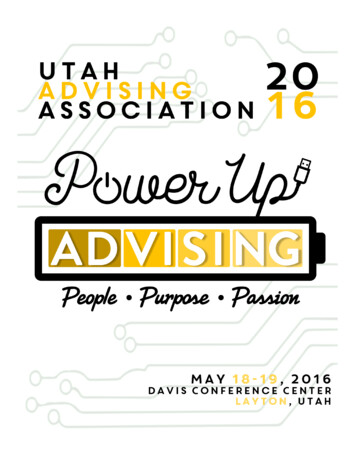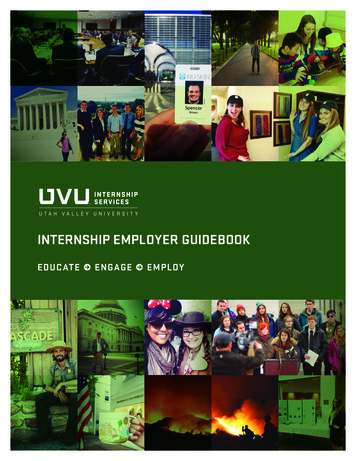
Transcription
INTERNSHIP EMPLOYER GUIDEBOOKEDUCATE ENGAGE EMPLOY
CONTENTSCONTACT INFORMATION . . . . . . . . . . . . . . . . . . . . . . . 2UVU INTERNSHIP PROGRAM . . . . . . . . . . . . . . . . . . . . 3STARTING AN INTERNSHIP PROGRAM . . . . . . . . . . . 5TEN CHARACTERISTICS THATATTRACT EXCEPTIONAL INTERNS . . . . . . . . . . . . . . . 9LEGAL ISSUES . . . . . . . . . . . . . . . . . . . . . . . . . . . . . . . 10FREQUENTLY ASKED QUESTIONS . . . . . . . . . . . . . . . 13WOLVERINE CAREERLINK USER GUIDE . . . . . . . . . . 15WOLVERINE CAREERLINK POSTING TEMPLATE . . . 16 Our Mission for Engaged LearningUVU values student engagement, scholarly excellence, and creative work. Wesupport active learning and professional development for students, faculty, andstaff. We cultivate community leadership and strong relationships that extendthe university into the workplace and region.—Matthew Holland, PresidentUtah Valley UniversityUVU INTERNSHIP SERVICES : 801.863.6589 : uvu.edu/internships1
CONTACT INFORMATIONDirector of Internship ServicesNiki Swan801.863.6004nswan@uvu.eduInternship ManagerMartin ive SupportStacie Brown801.863.6589stacie.brown@uvu.edu 2Resources for preparing this guide: Michael True, Director Internship Center,Messiah College, Grantham, PA; Metropolitan State University at Denver;Internships.com, Interns: A Basic Resource Guide for Employers; NationalAssociation of Colleges and Employers Position Statement, July 27, 2011.uvu.edu/internships : 801.863.6589 : UVU INTERNSHIP SERVICES
UVU INTERNSHIP PROGRAMWHAT IS AN INTERNSHIP?An internship is a pre-professional career training experience. An importantelement that distinguishes an internship from a short-term job or volunteerwork is the intentional “learning objectives” that are structured into theexperience. Internships provide students with opportunities to explorecareers and apply academic theory in the professional world. An internshipis generally a one-time experience that spans a single semester; however, itmay continue beyond that time if agreed upon by the student and internshipprovider. The internship may be part-time or full-time, paid or unpaid.BENEFITS TO EMPLOYERSFind future employees.Interns provide a year-round source of highly motivated pre-professionals.By implementing an internship program you will have an ongoing pipeline offuture full-time employees.Test-drive the talent.Hiring someone as an intern is the most effective way to evaluate theirpotential as a full-time employee. Starting an internship program lets youbenefit from added manpower, while more accurately assessing candidates.Increase productivity.Interns can free up time for professional staff to pursue tasks where higherlevel strategic thinking or expertise is required. In addition, interns are qualitycandidates for temporary or seasonal positions and projects.Enhance perspective.Interns bring with them novel perspectives, fresh ideas, and specialized strengthsand skill sets. These augment the abilities of your professional workforce.Take advantage of low-cost labor.Interns are an inexpensive resource. Their salaries are significantly lower thanstaff employees and while their wage requirements are modest, they’re amongthe most highly motivated members of the workforce. Please note that interntasks should relate to agreed upon learning outcomes.Breahnna RobinsonSandy City Police Department“I would go as far as saying that myinternship has changed my life. It hasbroadened my horizons, given meexperience that I would have otherwisehad to wait years to receive, and it hashelped me prove what I’m capable of tomyself. This is one of the best decisionsthat I’ve made toward my future careerand I would urge everybody to get aninternship in the field they want to work in.”Recruit free of-charge.Create your company profile and post your internship free of-charge withUtah Valley University which will give you access to the top college candidateswithout putting a dent in your recruiting budget.Give back to the community.Creating an internship program is an excellent way to give back. Hiring internsnot only helps students in your community get started; it enhances the localworkforce as a whole.UVU INTERNSHIP SERVICES : 801.863.6589 : uvu.edu/internships3
UVU INTERNSHIP PROGRAMESSENTIAL CRITERIA FOR ANINTERNSHIP EXPERIENCE1. The experience must be an extension of the classroom; a learning experiencethat provides an application of the knowledge gained in the classroom. Itmust not be simply to advance the operations of the employer or be the workthat a regular employee would routinely perform.Ashton KirkWavetronix“My internship at Wavetronix gave me theopportunity to apply what I was learningat UVU. I was given real businessproblems and had to use my knowledgeto find solutions. My internship was thefirst experience I have had interactingin a professional work environment andI was able to see what it is like to havea career in my major. I was even offereda position for permanent employment.This was the perfect supplement to myeducation at UVU and I recommend aninternship to everyone!”2. The skills or knowledge learned must be transferable to other employmentsettings.3. The experience has a defined beginning and end, and a job description withdesired qualifications.4. There are clearly defined learning objectives/goals related to theprofessional goals of the student’s academic coursework.5. There is supervision by a professional with expertise and/or educationalbackground in the field of the experience.6. There is routine feedback by the internship supervisor.7. There are resources, equipment, and facilities provided by the host employerthat support learning objectives/goals.8. Generally, a UVU intern must work 60-75 hours for each college credit.PAID VS UNPAID INTERNSHIPS4PA ID IN T ER NSHIP SUNPA ID IN T ER NSHIP SMay be taken for credit or just for pay. COLLEGE CREDITOPTIONAL, but highly encouraged. ( The university has nojurisdiction over internships not taken for credit. )Must be taken for academic credit.Workers’ compensation provided by employer.Workers’ compensation provided by university.Tracked by faculty supervisor or university internshipcoordinator, if taken for credit.Tracked by faculty supervisor or university internshipcoordinator.Students may choose to stay longer in their positions and betrained to do more advanced work.Students may stay in their unpaid position only as long asthey continue to receive credit.Paid interns are less likely to have competing job demandsand can often work more hours.Unpaid interns are only able to work hours equivalent totheir credit requirements.Performance evaluation required and site visit may takeplace, if taken for credit.Performance evaluation required and site visit may take place.COLLEGE CREDIT REQUIRED.uvu.edu/internships : 801.863.6589 : UVU INTERNSHIP SERVICES
STARTING AN INTERNSHIP PROGRAM1: SET EXPECTATIONSWhat does your organizationhope to achieve from the program? Are you a small organization searching for additional help on a project? Is your organization growing quickly and having difficulty findingmotivated new employees? Are you a nonprofit that doesn’t have a lot of money to pay, but canprovide an interesting and rewarding experience? Is your organization searching out new employees with managementpotential? Is your organization looking for a way to recruit new and motivated talent?Survey your company, asking departments if they want interns, what skill sets,and how many interns they need. For an internship to succeed, it is necessaryto get the entire company on board. Discuss with management how aninternship program can help your organization reach its objectives. Once thereis a consensus on program goals the internship can be designed to best meetthose expectations.2: PLAN AND DESIGNDraft a job description that clearly explains the intern’s duties and skillrequirements. Do you want someone for a specific project? What aboutgeneral support around the workplace? How about giving the intern a taste ofeverything your company does? Structure the internship ahead of time to besure to meet your goals.Jordan JarmanRoosevelt Park Zoo“My internship gave me the opportunity tosee what it takes to be a zookeeper andproved to me that, “Yes. This is what Iwant to do for my career.” I met amazingpeople and now have references in myfield. I gained invaluable experience thatwill stand out on my resume and had anincredible adventure at the same time!”Questions to consider:Will you pay the intern?While organizations differ and your company may not be in a position to paymuch, carefully consider whether you can offer a paid opportunity. Rememberthat students have expenses, including tuition, and even a small wage can makea big difference in recruitment and retention. If you have questions regardingpay rate, please contact Internship Services to help you determine competitivewages in your field. Also see Legal Issues in this guide.Where will you put the intern?Do you have adequate workspace for the intern? Will you provide a computer,phone, or other needed equipment? Is free parking available?UVU INTERNSHIP SERVICES : 801.863.6589 : uvu.edu/internships5
STARTING AN INTERNSHIP PROGRAMSAMPLE TASKS UNDERGRADUATE STUDENTSHAVE PROVIDED FORSPONSORINGORGANIZATIONSPerforming laboratory testsWriting handbooks or manualsDesigning posters, chartsand graphsGenerating financial forecastand cost recovery reportsPerforming software/hardwaremodificationsConducting studies and surveysDeveloping slide/sound presentationsCompiling technical reportsCreating academic lesson plansConducting researchGenerating marketing plansWhat qualifications do you want in an intern?Establish expectations for skill requirements beforehand — it will helpyou pre-screen the applicants and find the best candidates. Keep yourexpectations realistic. Students want to learn and be challenged, but they arenew to their fields and are seeking internships to enhance their skills andexperience as well as to contribute to your organization.Who will have primary responsibility for the intern?A very important part of your plan should be the assignment of asupervisor — that is someone who will be in charge of guiding and evaluatingthe intern. Please assign an employee who is committed to, and capable of,supervising and mentoring. To ensure the highest quality learning experiencefor UVU interns, we request that site supervisors be professionals in the fieldand have background experience in the intern’s learning objectives.What will the intern be doing?Be as specific as possible when writing your job description. Includedaily duties, short descriptions of projects the intern will be involved in,opportunities for learning and the skills or knowledge required.How many hours will the intern work?Consider the work/project you will have the intern doing, your needs and thepotential student’s schedule. Internships may be full or part-time, however,the average is 15 to 20 hours per week. Generally, students must work 60-75hours to receive one hour of college credit.What additional benefits can you offer an intern?Will there be special training programs, performance reviews, and luncheswith executives or social events? Reward an unpaid intern in other ways. Ifyour company has a cafeteria, give the intern a pass that enables him/her toeat for free on working days. Take the intern to a professional meeting as yourguest, paying for his/her lunch and introducing them to other professionals.Give a gift certificate at the end of the internship as well as write a letter ofrecommendation. Interns are your best source of future interns, and studentsshare information about their experiences. Make sure everyone wants to internat your company, so you have a wide selection of excellent applicants.Conducting training packagesPreparing budgets andfinancial reports3: RECRUIT AN INTERNPost the internship on Wolverine CareerLinkAccess the online Wolverine CareerLink at www.uvu.edu/careerlink andclick on the “employers” link. At this site you can create a company profileand submit position announcements electronically. Once an internshipposting is received it will be made available to students and faculty throughthe online internship database and on the weekly Hot Internship Email.6uvu.edu/internships : 801.863.6589 : UVU INTERNSHIP SERVICES
STARTING AN INTERNSHIP PROGRAMIf you prefer, you may complete the internship posting template at www.uvu.edu/internships/employers and e-mail it to the Internship Services Office(See Addendum 1 and 2 later in this guidebook).We recommend posting positions in consideration of the semester schedulewhen possible; however we can be flexible with student’s start and end dates aslong as they work the required number of hours. Students may also register forblock courses which last only eight weeks instead of the full 16 week semester.Spring Semester Dates:Beginning of January to end of AprilSummer Semester Dates:Beginning of May to mid-AugustFall Semester Dates:Last week of August to mid-DecemberConsider your recruitment time frame and post your position accordingly. Ifpossible, plan to post your position 1 – 3 months before the semester begins.4: COMPLETE A MASTER INTERNSHIP AGREEMENTPrior to the starting date of the internship, Utah Valley University requiresthat the internship site provider sign a Master Internship Agreement withthe university. This protects all parties and defines the responsibility of eachpartner in the internship agreement. The Master Internship Agreement canbe found on the Internship Services website, www.uvu.edu/internshipsunder the employer tab. The signed agreement may be faxed or emailed to theInternship Services Office. If you have questions or need revisions made tothe standard agreement, please contact the Director of Internship Servicesfor assistance.5: HIRE AN INTERNRemember to choose your interns carefully. After all, they might be permanentemployees someday. You’re making an investment; time and money will go intothis person.We strongly encourage a face-to-face interview if at all possible. For you, it isa chance to determine if the intern is truly motivated and a good fit for yourorganization. For the student, it is an opportunity to find out if the internship isthe right match for his or her goals and a chance to practice interviewing skills.Learn the legal implications of hiring interns. Just like any other workers, theyare subject to legal protections and regulations. Protect yourself and your internby knowing the laws. This is especially important if your company employs a lotof international students, who need special qualifications to work in the UnitedStates. Consult your company’s legal counsel or the Internship Services Officeif you have questions. ( See legal section later in this guidebook. )UVU INTERNSHIP SERVICES : 801.863.6589 : uvu.edu/internshipsMatt BrysonSenate Finance Committee“The engaged learning experience thusfar in my internship has enlightenedcareer opportunities, opened doorsof networking, and transformed mycapabilities as a citizen, student, andpartner in our community.”7
STARTING AN INTERNSHIP PROGRAM6: MANAGE THE INTERNSHIP EXPERIENCEOrient your intern to his/her new workplace.Introduce him or her to co-workers and provide a complete tour of the facility.Cover organizational structure, safety regulations, security or confidentialitypolicies, and acceptable dress and appearance standards.Give your intern the resources and structure he/she needs to do the job.Develop challenging work assignments relative to the student’s abilities andacademic background. Provide opportunities for increasing responsibility. Designa list of work activities and potential projects to guide the student workflow.Efforts should be taken to provide guidance in long term project goals, day-today responsibilities, and overflow work assignments for down times.Nathan PackerIBC Advanced Technologies“My internship has been an invaluablestepping stone to give me experiencethat I will need after I graduate. It alsostarted me off at a salary that has givenme the confidence that I can go out andfind other jobs that will pay me more.Before this internship I didn’t have theknowledge of how my degree could beused in the real world. Now I do.”Keep an eye on your intern.Remain accessible and schedule intentional times to meet and discuss tasks andresponsibilities. We suggest that you meet with your intern weekly to assesshis or her progress and provide feedback concerning performance. Duringthese meetings the intern can report on the status of a project and pertinentdeadlines, ask questions, and get an idea of what kind of work lies ahead.Provide lots of feedback to your intern.Make sure to address both positive observations as well as recommendationsfor improvement. Include assessment of learning objectives and goals in yourmeetings and make sure to monitor the successful completion of tasks.7: EVALUATE THE INTERNHost a site visit.Your intern’s coordinator or faculty advisor at UVU may contact you toschedule a site visit to discuss the student’s progress. Generally this is a shortmeeting, with the student present, which serves as an opportunity to sharethe intern’s accomplishments, discuss any concerns, and give feedback to theuniversity regarding intern readiness for the industry.Complete an evaluation.Toward the end of the semester you will receive an evaluation form fromthe student. Timely completion of the evaluation is important to ensure thatfaculty advisors have all information necessary to provide the appropriate gradeassignments for a registered student. The evaluation provides formal, writtenfeedback to the intern about the experience. We encourage you to go over yourcomments and ratings with the student at the conclusion of the internship. Thestudent is responsible for turning this evaluation in to their department internshipcoordinator or faculty advisor.8uvu.edu/internships : 801.863.6589 : UVU INTERNSHIP SERVICES
TEN CHARACTERISTICS THAT ATTRACT EXCEPTIONAL INTERNS1Fits the student’s needs. The first thing a studentconsiders is whether the internship meets theirspecific needs. Is the nature of the work a match fortheir major and career objectives? What is the time frame,duration, and location of the program? How is theprogram structured in terms of hours and days per week?Be sure to include these items in the internship posting.2Compensation. The unfortunate reality is thatnot all students can afford to work for free,no matter how much they might be motivated andinterested in your industry. So before you decide youcan’t compensate interns at all, consider whether yourbudget might accommodate a more modest wage.3Appealing perks. Even if you can pay internsa standard wage — and especially if they’ll beworking without compensation — give some thoughtto how you might entice the cream of the student cropwith some (seemingly trivial) incentives. Extras like freebreakfasts or lunches with the CEO can boost morale bycommunicating to interns their value to the company.4Meaningful work. Possibly more than anythingelse, interns are constantly clamoring for more“meaningful” work. Remember, their primary objectiveis to learn both about the business in general as wellas to acquire the specific skills necessary to functioneffectively in the industry. When you “use” studentssimply to perform grunt work, you are robbing themof the opportunity to develop their knowledge andabilities. In short, a program without meaningfulwork is rendered meaningless to the intern.5Inclusion. Including the intern whenever appropriate serves a dual purpose: It exposes them tomore situations in which they can observe supervisorbehavior and interactions. Moreover, it makes them feelpart of the team. In the end, an intern who was treatedlike an “insider” is much more likely to accept a job offeror to speak favorably about a company to their peers.6Supervisor accessibility. In the best internshipprograms, there is always someone available to theintern. When the direct supervisor is out or occupied,there should be someone else assigned to the intern;and the intern should be made aware of this person andhow to get a hold of them. Therefore, if at any point theintern has questions, they know there’s someone who can,if not answer their question, at least assign an interimtask or let them know when their supervisor will return.7Detailed direction. Popular internshipprograms see to it that supervisors give easilyunderstandable direction. Because not only does thisreduce feelings of frustration, it gives the intern theinformation they need to succeed. Remember, anintern who feels proud of their accomplishments willmore likely feel pleased with the program itself.8Effective evaluation. Students want to succeed.But the only way they’ll know if they’re fallingshort or exceeding expectations is through feedback.In a highly rated internship program, evaluations arestructured, scheduled regularly, and include both praiseand critique. Most importantly, criticism is coupledwith clear direction on how to make improvements.9Appealing environment. Just like permanentemployees, interns want somewhere comfortableto come to work on both a physical and personal level.On the physical front, interns should have a workspacewhere they don’t feel like they’re intruding on another’sterritory. And they certainly need their own chair anddesk (or at least a dedicated tabletop). Also, employersmust make sure interns have easy access to any necessaryequipment: computer, printer, phone, fax, etc.On the personal front, friendliness and helpfulnessgo a long way in affecting an intern’s opinion ofan organization. Above all else, interns should betreated with the same respect as any employee.10Candidness & congruency. Beginning withthe posting of the position, it’s importantthat employers are honest about what the student canexpect from the internship. Misrepresenting the ratioof meaningful work to mindless work, the numberof expected hours, or the skill set and/or subjectmatter involved can cause your program to develop anegative reputation. Moreover, pretending a programis something it’s not, in order to attract candidates,takes away an intern’s ability to choose the positionbest suited to their academic and career objectives.UVU INTERNSHIP SERVICES : 801.863.6589 : uvu.edu/internships9
LEGAL ISSUES*Do I have to pay interns?Paid interns make ideal workers — hungry to learn, eager to make a goodimpression and willing to perform a multitude of tasks. The relatively smallamount of money employers spend on intern wages and benefits is a goodinvestment. If pay is not possible, unpaid internships must comply with the U.S.Fair Labor Standards Act ( FLSA ). This legislation applies to employers thathave at least two employees engaged in interstate commerce and annual grosssales of least 500,000, employers who are engaged in beneficent activitiessuch as operating hospitals and schools, and activities of public agencies. Thislaw has determined that you don’t have to pay interns who qualify as learners/trainees. The U.S. Department of Labor has outlined six criteria for determiningtrainee status. All of these conditions must be met in order for the intern toqualify as a “learner/trainee.”Alexis SpencerHaiti Health Initiative“During my time both in Haiti andpreparing to leave for Haiti I was able toutilize the tools, skills, and knowledgeI received throughout my courseworkat UVU on an actual real world project.The internship gave me hands onexperience that sets me above mypeers when applying for graduate schoolor employment. The combination ofmy education received at UVU andmy experiences in Haiti has providedme with an opportunity to lead andimplement another project this comingsummer. I would not have received thisopportunity without the help of UVU.Ironically, while I was teaching the peopleof Haiti how to better their life they wereteaching me what life is all about. It wasa life changing experience.”1. Interns’ training must be similar to the training that would be given in aneducational environment, even though it likely includes the actual operationof the facilities of the employer.2. Interns’ training must primarily benefit them, not the organization.3. Interns cannot displace regular employees and must work under the closesupervision of existing staff.4. The employer providing the training derives no immediate advantage fromthe activities of the intern.5. Interns are not guaranteed a job at the end of the internship ( though you maydecide to hire them at the end of the experience ).6. Interns are not entitled to wages during the internship.If all six factors above are met, it is likely that the individual participating inthe internship or training program may do so without being paid.The FLSA does not limit an employer’s ability to hire paid interns or restrict apaid employee’s ability to receive college credit for their work. It also does notlimit unpaid internships for non-profits who rely on volunteers for their labor.Please reference the U.S. Department of Labor Fact Sheet #71:www.dol.gov/whd/regs/compliance/whdfs71.htmCan independent contractors ( 1099 ) be interns?* The text is this section isinformational only and doesnot constitute legal advice.10Generally not. In most cases, independent contractor ( 1099 ) positions arenot appropriate as internships because the legal definition of an independentcontractor assumes that the student needs no training and can performtheir duties independently. An independent contractor is not controlled orsupervised by the company. This is at odds with the concept of an internship.uvu.edu/internships : 801.863.6589 : UVU INTERNSHIP SERVICES
LEGAL ISSUESMust I provide workers’ compensation?Unpaid Interns: Utah Valley University requires unpaid interns to receiveacademic credit. Unpaid interns are covered with workers’ compensation andliability insurance by the university only if they are receiving college credit.Paid Interns: For paid internships, the employer is required to provide workers’compensation benefits along with any other benefits required by law. A stipendis considered a paid position and the employer is responsible for providingworkers’ compensation. See the following statements from the MasterInternship Agreement that a site provider signs prior to hiring an intern.SEC. 2.4If a student intern will not be paid for an internship positionoffered pursuant to this Agreement, the Parties acknowledge,and agree to comply with, the Utah statutory provisionsregarding unpaid interns at Utah Code Ann. §53B-16-401, etseq. Accordingly, no such intern is an employee of ExperienceProvider, but rather is a volunteer worker of UVU solely for thepurposes of receiving workers’ compensation medical benefits, ifapplicable SEC. 2.5If a student intern will be paid for an internship position offeredpursuant to this Agreement, the intern will be a non-exemptemployee of Experience Provider, which shall be responsible forproviding to the intern all applicable wages, benefits, statutorywithholdings, workers’ compensation benefits, and otheremployment benefits required by applicable law Yanko DzhukevUnited Nations“Working at Food and AgricultureOrganization has been amazing.What I like the most is the fact thatI am working in organization withsuch a global impact. FAO has somuch influence all over the world.And just being a part of it, even asan intern, feels great. Every singleday I learn something different.”What employment issues need to bediscussed with the intern before hiring?The employer should identify the specific terms and conditions of employment( i.e. the start and end dates of the internship, compensation, organization and/or reporting relationships, principal duties, tasks or responsibilities, workingconditions, confidentiality, and any other expectations of the employer ). Theseshould be discussed when recruiting an intern, and at the intern’s orientation,so there is no misunderstanding regarding these matters. Also, take time toadvise your interns about appropriate workplace behavior, the organization’sharassment policy, and complaint procedures. It may make good sense todocument such a discussion with a written agreement.UVU INTERNSHIP SERVICES : 801.863.6589 : uvu.edu/internships11
LEGAL ISSUESWhat are my obligations regarding equalemployment opportunity regulations?The employer will comply with all federal and state statues and Universitypolicies relating to nondiscrimination, including but not limited todiscrimination on the basis of race, color, national origin, sex ( includingsexual harassment ), sexual orientation, gender identity, age and disability.Are employers required to provideunemployment insurance to interns?Utah requires employers to provide unemployment insurance to paid internsunless all of the following factors apply to the internship: The intern is enrolled as a student in a full-time program at a non-profitor public educational institution; The non-profit or public educational institution where the intern isenrolled maintains a regular faculty and curriculum and has a regularbody of students in attendance where educational activities take place; The intern is receiving credit for the program; The program combines academic instruction with work experience; The educational institution has certified to the employer that theinternship is an integral part of the program; and The service provided by the intern is not being performed in a programestablished for or on behalf of an employer or a group of employers.Eli PetersonLone Peak Conservatory“I spent all last summer doing a paidinternship on a wildland firefighting crew.I not only gained experience and collegecredits but also made eno
Messiah College, Grantham, PA; Metropolitan State University at Denver; Internships.com, Interns: A Basic Resource Guide for Employers; National Association of Colleges and Employers Position Statement, July 27, 2011. Director of Internship Services Niki Swan 801.863.6004 nswan@uvu.edu Internship Manager Martin Overly 801.863.6308
